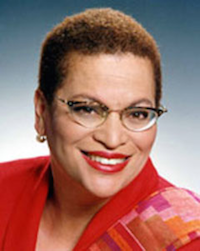June 12, 2015

Julianne Malveaux, NNPA Columnist
When racist attitudes, either conscious or subconscious, are combined with the discretionary powers that law enforcement officers have, the result is a differential outcome, with African Americans more likely to be the targets of “blind justice.”
Most of our politicians and leaders are exploiting subconscious racism, and pandering to explicit racial fears. Even worse, they are rewarded when they say they are “tough on crime.”
Soledad O’Brien documented some of these attitudes in her most recent “Black In America” series. Included was an interview with a young Black man was stopped more than 100 times as he stood outside his college. Of course, he’d done nothing wrong, but police officers, “doing their duty,” felt free to harass him.
In a more telling segment, two young men, one Black and one White, staged the “stealing” of a bike to show how members of the public responded to watching the apparent theft. The young men were dressed similarly – T-shirts, casual pants, caps. People walked by as the White guy did everything he could to break the lock on the bike, including using a chain cutter. One even offered to help him take “his” bike, even though he acknowledged it was not his.
Within moments of the Black man approaching the bike, White people, one or two of whom called 911, surrounded him. As opposed to the benign response the White guy got, the Black guy was simply assumed to be a criminal.
How does this play out on the streets and with officers of the law? Police officers use their discretion selectively. A Black man (Eric Garner) selling loose cigarettes is manhandled, arrested, and dies when he is choked and cannot breathe. Most have seen the video by now, and wonder why Daniel Pantaleo was not charged with any crime, even though he used an illegal chokehold on Garner.
Pantaleo could have told Garner to move on, or he would risk arrest. Instead, Pantaleo and his posse of lawless cowboys chose to kill the man. Would a White man be similarly treated, or did unconscious racism play into the callous way Eric Garner was treated?
During the late 1990s, Mayor Rudy Giuliani’s “stop and frisk” policies resulted in African American men being stopped more than five times as frequently as Caucasians, even though these frisks led to nothing more than the humiliation of Black men, some simply coming off the subway or walking down the street. Hispanic men were stopped about three times as often as Caucasians. White men were stopped and frisked less frequently than others. Unconscious racism? Discretion? The law sanctions both.
Stop and frisk incidents increased dramatically with no concomitant increase in crime. However, since New York Mayor Bill Blasio took office, the number of stop and frisk incidents has dropped by almost three quarters, again with no increase in crime. It appears that whether stop and frisk occurrences are aggressive or gentle; the incidence of crime does not increase.
There are many occurrences where police can make discretionary decisions. First, they can decide whom to stop. Then, when they stop they don’t have to arrest or frisk. A simple conversation that explains the reason for the stop will yield a more favorable outcome than wrestling someone to the ground, knee in his or her back, or handcuffing someone without explaining why.
Police resistance to the use of body cameras suggests these officers know that they are out of order in dealing with the public. Once someone is arrested, the police have the right to charge him or her with a minor crime or let them go. Finally, prosecutors can decline to bring charges. All of these decisions can be minimized or maximized, based on discretion.
Justice is not blind when police officers use discretion to stop one segment of the population to harshly mistreat and let the other population slide. If police officers wonder why there is antipathy and distrust toward them in the African American community, somebody needs to tell them that their use of discretion suggests that justice is hardly blind.
Julianne Malveaux is author and economist. She can be reached at www.juliannemalveaux.com.

